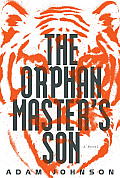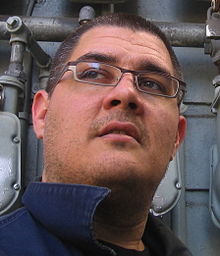 Adam Johnson’s The Orphan Master’s Son was one of my toughest reads ever. Not because of long words or Finnegan’s Wake circumlocutions, but because of character and setting.
Adam Johnson’s The Orphan Master’s Son was one of my toughest reads ever. Not because of long words or Finnegan’s Wake circumlocutions, but because of character and setting.
Johnson sets us down in North Korea sometime in the recent past. The first section is entitled “The Biography of Jun Do,” the given name of title character. Jun Do was raised in an orphanage, but by his own lights, is not an orphan. The Orphan Master was required to live in the institution, thus had to keep his son with him. As the narrative goes on, we begin to realize that this story, like so many others in this isolated, repressive society, is one created to fit the requirements of the psychological situation rather than the facts.
If Jun Do were truly an orphan, he would drop even a peg lower in this “egalitarian” mess than he his now. His job is to cruise the waters surrounding his country in a fishing boat smuggling currency, weapons, whatever the Dear Leader requires. Sometimes he and his comrades take the boat to Japan or South Korea and slip into those corrupt societies to purloin some item or person the Dear Leader has requested—a soprano at one point. Jun Do is trained in Tae Kwan Do and is an expert at giving and receiving torture.
At one point they are boarded by Americans in international waters and accused of possessing something they—for once—do not have. This boarding leads to complications that eventually take Jun Do on a trip to–of all places–Texas and thence to one of the camps where all those have offended the state, or are suspected of offending it, or who might know someone who offended it or is suspected of offending it go to be punished for their suspected crimes. And from that “point forward nothing further is known of the citizen named Pak Jun Do.” An abrupt shock to the reader. At least this one.
So, do we switch characters now? Yes and no. Part of the process of inventing stories to fit the situation rather than the truth is, it turns out, to recycle identities. Thus, does Jun Do become his arch-enemy, Commander Ga, take over Ga’s household, including his wife—the exotic film star Sun Moon—and his children.
We are joined around this time by one whose job it is to torture, though he’s a proponent and practitioner of more humane methods than those who merely break bones and deliver shock treatments. He is the only character in the book whose narrative takes the first person, which has the effect of giving us an intimacy with the internal operations and thinking of the societal machinery that heretofore had been rather alien and aloof.
It is perhaps at this point that The Orphan Master’s Son takes leave of anything we might consider reality, but does it in such a way that we find ourselves beginning truly to comprehend the brutality of this totalitarian society, one which surpasses even the ugliness of Stalin and Hitler.
Bad enough that blood is drained from torture victims just before they die to keep the hospitals stocked. Bad enough that one is forbidden to feed the hungry because it implies that the government can’t take care of its own. Bad enough that loudspeakers blare government propaganda day and night. Bad enough that anyone anytime anywhere can be swept from the streets and conscripted for harvest or sent to the mines or worse. The worst part is that all “citizens,” at least within the pages of this novel, are constantly confused about who they, or their neighbors, or their family, are or might become. Identity is a shapeshifting myth that depends on the whim of the state.
There are some scenes of brilliant satire here between the American Texan Senator and his entourage and the Dear Leader’s attempts to manipulate and placate them. Scenes worthy of Catch-22. But it’s hard to laugh because we know there’s a real monster in the wings.
Trauma narratives, says Johnson in an interview with David Ebershoff, are hallmarked by fragmentation, broken chronology, changing perspectives, shifts in tone, and absented moments. . .North Korea, I believe, is a trauma narrative on a national scale.
And The Orphan Master’s Son, is a trauma narrative on a scale that will leave me disturbed for some time to come.
